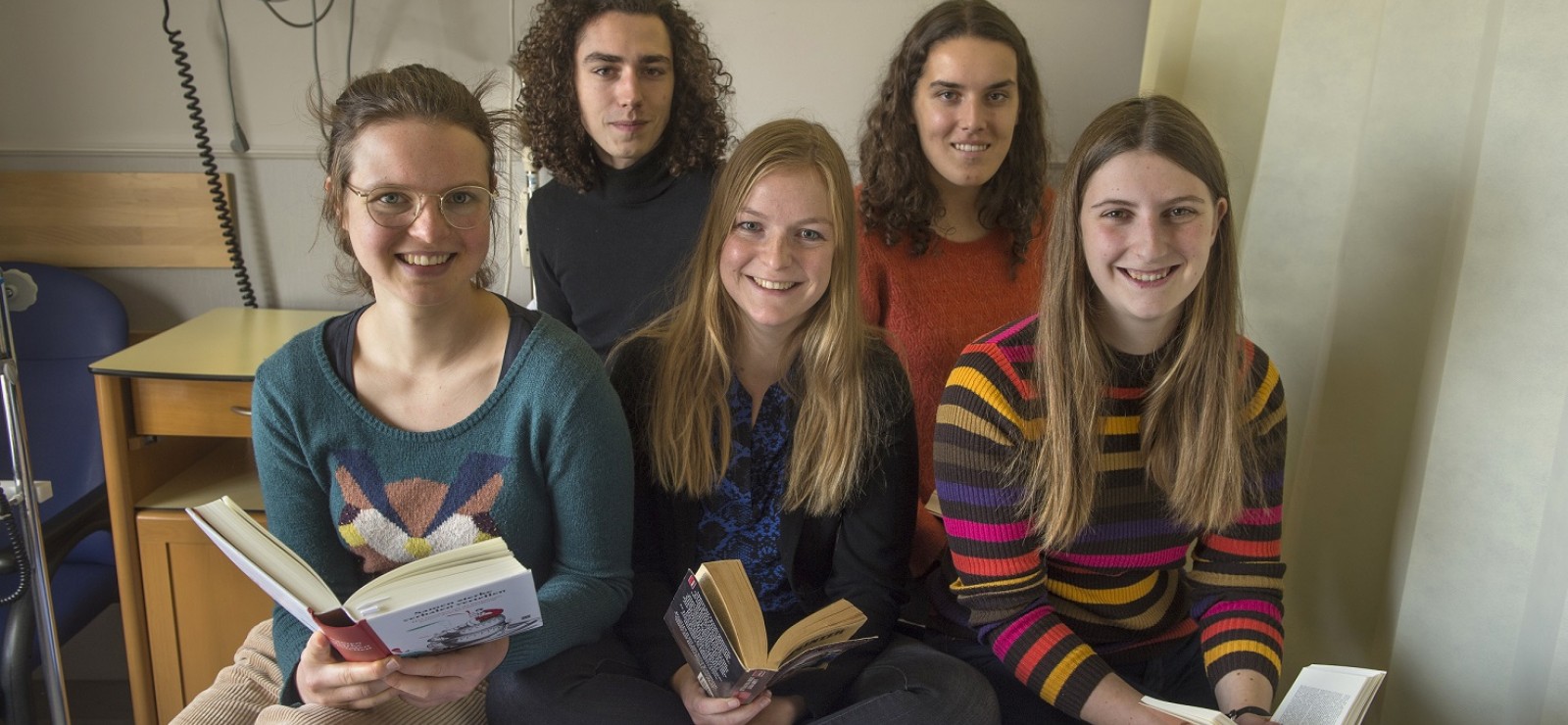If you get cancer, it often means intensive medical treatment right away. That’s normal: you’ll need medication to combat the disease. But cancer patients are more than just their illness, and treatments are more than just medical help. Professor Tessa Kerre emphasizes the importance of kinder care, or making healthcare human. The Ghent University reading project is a good example of this.
Recalling memories
This reading project brings students and patients closer together: twenty students from the Faculty of Medicine and Health Sciences read to an equal number of cancer patients. They do this during hospital admissions, which can often be for a very long time. Each student reads to one patient. Not just in a straightforward way: they actually take their time and make breaks to exchange ideas about the book, poem or short story. Why? Well reading during treatment diverts attention from anything to do with the disease. The extracts make patients think back to certain moments in their lives. Sometimes these bring back good memories, but sometimes texts can be more difficult and make even painful matters discussable. Professor Tessa Kerre (head of the Hematology Clinic at UZ Gent and senior lecturer at Ghent University) is one of the driving forces behind the project. Postdoctoral researcher and psychologist Gaëlle Vanbutsele is also accompanying the project, together with a few other colleagues. “It is incredible how quickly many of our students develop a strong bond with their patient. It gives an extra dimension to healthcare.”
Alleviate medical care
The human aspect of care is one of Tessa’s obsessions. “Of course medical care is essential. But cancer treatment is so much more than a chemo pill or a radiation session. For example, I always talk to my patient. I ask how their family is, for example. Or I talk to them about the photos in their room or about the book on their nightstand. For me, that is kinder care, and an integral part of the medical care. Through this project, students get to know patients as human beings. They learn that healthcare is so much more than just medical assistance, and that is very important in their later career as a healthcare provider.”
Stronger through connection
The seed for the reading project was sown three years ago. That was when a number of colleagues from the Faculty of Arts and Philosophy came together with care providers from UZ Gent. They soon came up with the idea of having students read to cancer patients with active treatment. Cancer treatments are often very intensive and take over a patient's life. Reading provides relaxation, and moments of rest and distraction. The initiators also included some members of Het Lezerscollectief, a Flemish subsidiary of The Reader Organization from Great Britain. This is a network of readers who organize reading meetings for people who have problems accessing literature. For example, prisoners, people in a residential care center or people with psychological problems. Thanks to these meetings, they’ve discovered that reading together connects people, and establishes a connection that makes them stronger and more resilient. “Of course we now have to wait for the results, but we expect a similar connection between the participants of the reading project. The effect may be even greater here, because the reading is much more intimate with us, and does not take place in a group”, says Tessa. “That can be an important added value in a treatment.”
Read also
‘Women are not just copies of men with breasts and ovaries.’
Van wetenschappelijk onderzoek tot medische behandelingen, decennialang stond de man centraal in de medische wereld. Betekent dat dan ook dat vrouwen daardoor minder goede zorg krijgen?
Deceased Juno’s friends run marathon for cancer research
Friends and relatives of Juno De Hauwere recently gathered at the starting line of the Ghent marathon. They weren’t just looking to achieve a sporting milestone, but above all they were there to honour Juno’s memory and raise funds for leukaemia research.
Research into rare eye diseases at Ghent University: “It’s fair to say we rank amongst the world’s elite”
Around 8% of the world’s population suffers from a rare disease. In Belgium some 800,000 patients are affected. One of them is eighteen-month-old Oliver, who was born blind. He is closely monitored by professor Bart Leroy, whose team has made remarkable progress in the research into rare eye diseases. Still, there are quite a few stumbling blocks as well.
Are vitamin pills innocent?
For many people, a daily dose of vitamins and minerals has become part of their everyday routine. Especially in winter we ingest massive quantities of vitamin D because we think it boosts our immune system. But is that accurate and is that daily vitamin pill as innocent as it appears?




